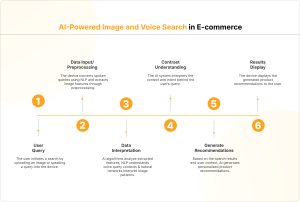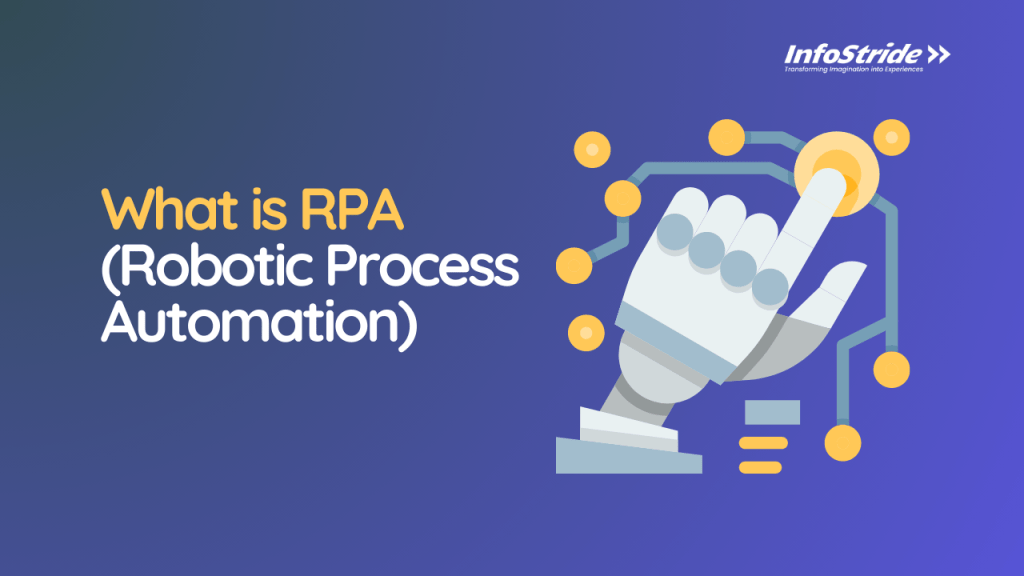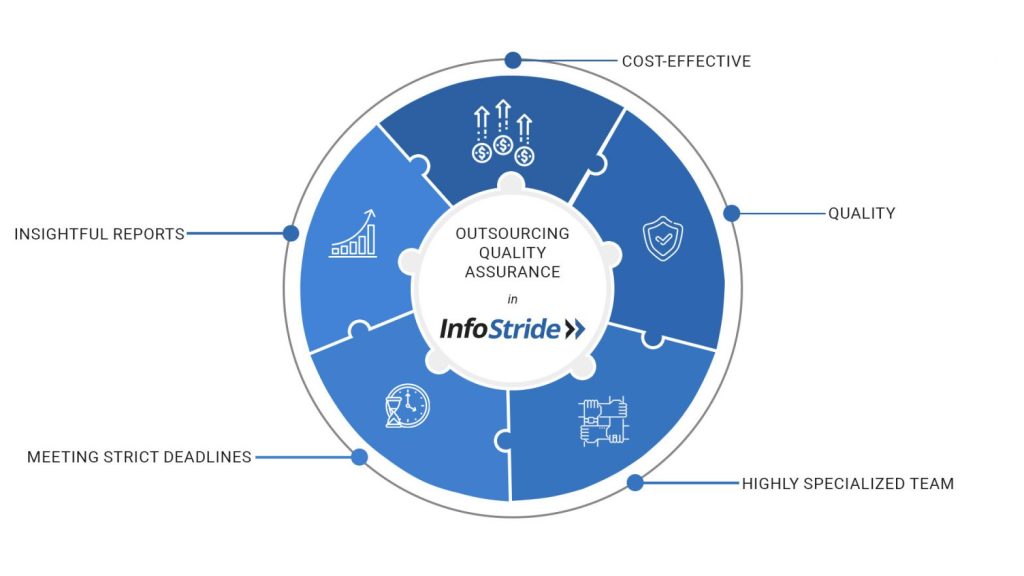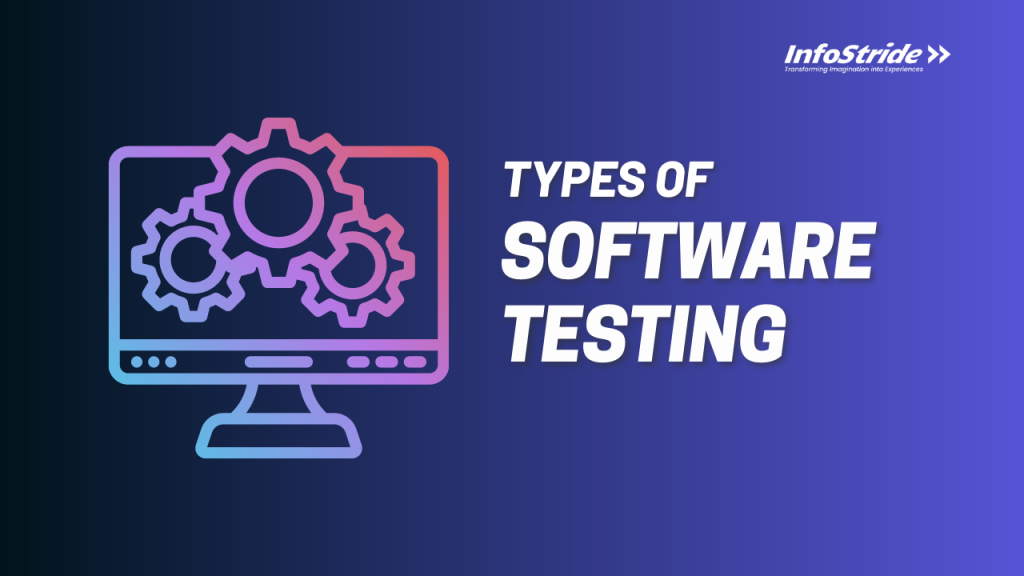Table of Content
Why Build an eCommerce App With Artificial Intelligence Capabilities?
Challenges in Building eCommerce App With AI Capabilities
How Leading eCommerce Brands Are Leveraging AI
How to Build an eCommerce App With AI Capabilities
Looking Ahead -Artificial Intelligence all Set to Become a Necessity in eCommerce
Until a few years back, the most common stereotype people carried of Artificial Intelligence was that of human-lookalike robots performing lots of versatile tasks without getting tired. Well, not quite the human-look alike but we’re starting to see those tireless capabilities come to the fore through the force of learning technology and algorithms. As per a study, by 2025 up to 80% of businesses will adopt AI technology in their operations. 2023 was a mega success for the all blazing technology, which saw the launch of large language models, the Humane AI Pin and perhaps the most astonishing of all, the creation of a Beatles song. AI is still in its infancy yet the heights it’s reached in such a short span of time is staggering. However, more awe-inspiring is in the offing with the convergence of AI with eCommerce. Retailers across the board are looking to implement AI in eCommerce apps in a bid to offer personalized and superior user-experiences to their customers.
Why Implement AI in eCommerce?
There’s a whole host of benefits from implementing AI in eCommerce apps/stores but perhaps the most important one is staying competitive. AI is a cutting edge technology that’s still evolving and it offers a plethora of benefits that are tough to ignore:
1. Personalization
AI technology is great at analyzing data and in the context of eCommerce, customer data. It can easily sift through everything from customers’ total visits, most active hours, browsing history, wish lists, order history, complaints/grievances and lots more. By clubbing all this, it can offer customers very personalized recommendations across all touchpoints, thereby elevating the user-experience and increasing the likelihood of conversions. Here’s how ASOS uses personalized recommendations based on shopping interests.

Source – ASOS
2. Customer Service Automation
With proper training on relevant customer support data, the AI chatbots can easily be positioned as the first line of customer support. They can answer customers’ queries based on their order history, quickly resolve complaints, offer tips and helpful suggestions to create a pleasant user experience. The customer service automation opens up a lot of time for dedicated support agents, which can be directed towards more creative and analytical undertakings.

Source – Haptik
3. Inventory Management
Manually keeping tabs on inventory is a laborious process and fraught with errors. That’s why, not long ago, inventory management was the biggest pain point for a lot of retailers and eCommerce businesses. Thanks to AI, optimizing inventory management is now possible without investing too much time and resources. The AI systems, owing to their data processing and forecasting capabilities, can help with predicting demand for each individual product. By acting on the predictions, inventory managers can rule out the possibilities of overstocking, understocking or even stockouts. In the long run, this saves cost, drives efficiency and increases customer satisfaction since their favorite products are never out of stock.
4. Dynamic Pricing
Dynamic pricing is one of the best ways for eCommerce stores to maximize their profits through the sale of their in-demand products. Dynamic pricing involves adjusting the price of a given product or product line based on a range of prevailing factors, chiefly, market conditions, competitor pricing and customer behavior. AI tools are tailor-made for such use-cases. They can be plugged into all the crucial data sources to arrive at the ideal pricing metric for your offerings.
5. Voice and Visual Search
Voice command is an inherent attribute of AI technology and its application in the ecommerce landscape renders an altogether new and modern approach to shopping. Using a range of voice commands, customers can make purchases, track their order delivery, and get quick answers to their common queries. All of this makes for a convenient hands-free shopping experience.
Another hallmark feature of AI technology, visual or image search allows customers to search for a product on an ecommerce store using an image on the internet or stored on their local device. The process takes the customer very close to finding an exact or similar match of a desired product, which makes for a satisfactory shopping experience.

Challenges in Implementing AI in eCommerce App
We’ve looked at how beneficial AI can be for the eCommerce stores in driving elevated customer experiences and maximizing revenue potential. That said, eCommerce businesses have to contend with some challenges; some of which are inherent in the technology itself, while some arise as a consequence adopting the technology. Let’s take a look at each one of these in more detail:
1. Data Quality & Quantity
Data is the fuel that drives AI technology. Data serves the basis for all kinds of predictions, forecasts, personalized offerings and so much more. To get the most of this data-dependent technology, one needs to have both the quantity and the quality of it in store; and when it comes to eCommerce businesses, they simply don’t have enough of it. Everything from data collection, cleaning and privacy compliance remains a sizable investment and one that a lot of early stage eCommerce startups seem to forego.
2. Integration With Legacy Systems
Not all eCommerce businesses operate on the cutting edge of innovation. A large majority still have legacy systems in place and for such outfits adopting the AI technology remains a major struggle. In scenarios where integration is possible, it isn’t without high complexity and costs. In others, where there’s no workaround, a complete overhaul of the present infrastructure is needed. Both scenarios are imperfect for AI adoption. Seeking consultation from an ecommerce development services provider can bring more clarity in these situations.
3. High Upfront Cost
While AI has made a splash across the eCommerce landscape, its full-scale application is still limited to the leading eCommerce firms in the industry. A vast majority of small and medium sized eCommerce outfits simply can’t meet the costs that go into developing and integrating AI solutions. The technology is relatively new and as such the process of hiring the right personnel, acquiring the necessary hardware and building AI models remains an expensive undertaking .
Also Read: eCommerce Website Development Cost
4. Data Privacy & Compliance
We’ve mentioned how AI technologies are data-dependent and in an eCommerce business, it’s going to be dealing with a variety of customer data. That’s where things get slightly tricky. Across geographies, there are different compliances and regulations with how a business may or may not use their customer data. Most globally acclaimed ones are GDPR and CCPA. For businesses wanting to build an eCommerce app with AI capabilities into their operations, ensuring proper data compliance is vital, else there can be some major unwelcome consequences.
5. Algorithm Bias
When an AI-model retains a bias towards a view, thought or principle expressed in the training data and then uses that bias in all its responses, we refer to that as algorithm bias. To address this, there have to be frequent data audits, and bias mitigation checks on the training data to maintain trust and fairness. If left unchecked, this can lead to unsatisfactory and discriminatory outcomes and defeat the whole purpose of attaining AI driven automation.
How Leading eCommerce Brands Are Leveraging AI
Amazon:
Amazon employs AI for its renowned purchase recommendation system, analyzing user behavior and preferences to suggest products tailored to individual tastes. Additionally, Amazon’s integration of AI in voice shopping enhances user convenience, allowing customers to make purchases through voice commands, providing a seamless and hands-free shopping experience.
Alibaba:
Alibaba has ventured into AI writing solutions, utilizing artificial intelligence to generate content. This not only streamlines content creation processes but also enhances the efficiency of various platforms within Alibaba’s extensive ecosystem, contributing to a more engaging user experience.
IBM’s Watson:
IBM’s Watson is a powerhouse in retail AI applications, with businesses like Frito-Lay and Home Depot leveraging its technology. Through Watson, supply chain operations are streamlined, making them more efficient and responsive. Additionally, Watson personalizes the shopping experience for each customer by analyzing data and tailoring recommendations based on individual preferences.
Emotive:
Emotive specializes in customized marketing messages powered by AI. By analyzing user data and behavior, Emotive’s AI crafts personalized marketing messages that resonate with individual customers. This tailored approach enhances customer engagement and strengthens brand-consumer relationships.
eBay:
eBay incorporates AI for customer advice and recommendations. Through the analysis of user interactions and historical data, eBay’s AI-driven algorithms provide valuable advice to customers, aiding in decision-making. The platform’s personalized recommendations enhance the overall shopping experience for users.
Rue Gilt Groupe:
Rue Gilt Groupe leverages AI for product recommendations, enhancing the discovery process for users. By analyzing user preferences and behavior, the AI algorithms recommend products that align with individual tastes, contributing to a more personalized and enjoyable shopping experience on the platform.
A Step-by-Step Guide on Implementing AI in Ecommerce Apps
While it’s an exciting undertaking to build an eCommerce app/store with AI capabilities, it’s advisable to do so with proper planning in place. This will help you stay aligned with the outcomes you’re looking to achieve and minimize the time and cost spends on otherwise incongruous undertakings.
Step 1 – Create a Strategic Roadmap:
This is a very basic step and one that often gets neglected. Before jumping on the AI bandwagon, make sure you understand the objectives and outcomes you wish to achieve on the other side of implementation. Invest serious thought into it, consult with AI innovators, CTOs and custom enterprise marketplace development service providers to get absolute clarity.
Take all the time you need to work out a practical strategy and roadmap to guide your AI implementation journey. Moreover, break down the journey into small, achievable milestones. You can always ramp up the pace once you start to make good progress.
Step 2 – Find Use-Cases That Are Relevant & Profitable For Your eCommerce Business
In identifying the use-cases for your eCommerce store or marketplace, make sure to take a broad overview of your business objectives, data differentiation, and the easy accessibility of artificial intelligence models. What this does is enables you to exploit revenue maximizing opportunities within your business context while leveraging the proven AI technology capabilities.
Step 3 – Take Third-Party Assistance
Even if you feel you have the team in house to handle all the implementation work, it’s never a bad idea to ask for an outside opinion. Hire a third-party team to take a closer look at your AI based eCommerce store requirements and have them suggest their approach on how to get things done in the best way possible. The expertise of an expert MVP development services provider can come in handy in helping you get your project off the ground and bring that MVP(minimum viable product) version to life.
Step 4 – Ease Your Way To Full Scale Solution
Once you have a successful MVP in place, the next step is to take it slowly towards a full-scale solution. By now, your team will have acquired a decent understanding of working with AI technologies. Still, it might take you a few iterations before you realize the desired solution. As you and your team get comfortable working in an AI-based ecosystem, you’ll begin to realize all the various benefits technology has to offer.
Looking Ahead -Artificial Intelligence all Set to Become a Necessity in eCommerce
In the rapidly evolving world of eCommerce, the imperative to integrate AI development services has never been more crucial. From revolutionizing user experiences to optimizing operations, AI opens avenues for unparalleled innovation and growth. As businesses strive to stay ahead, embracing AI becomes not just a strategic move but a necessity.
InfoStride is a leading ecommerce development company that stands ready to help you implement AI in eCommerce stores. With a proven track record in both AI and eCommerce software development, InfoStride brings a wealth of experience, innovative solutions, and a commitment to transforming your vision into a thriving reality. Reach out to our experts today to discuss how you can leverage AI into your eCommerce business to drive unprecedented growth and innovation.
Frequently Asked Questions
1. How does AI revolutionize the eCommerce landscape?
AI revolutionizes eCommerce by automating tasks, like personalized recommendations and efficient customer service through chatbots. It enhances decision-making processes by analyzing vast amounts of data, optimizing operations, and providing insights for strategic advancements in the marketplace.
2- Is AI integration in eCommerce suitable for businesses of all sizes?
Absolutely. AI integration in eCommerce is versatile, catering to businesses of all sizes. Whether you’re a small startup or a large enterprise, the benefits of AI, including automation, data-driven insights, and personalized customer experiences, can be tailored to suit your specific needs.
3- How can AI enhance customer interactions in an eCommerce setting?
AI enhances customer interactions by deploying chatbots for instant assistance, recommendation engines for personalized product suggestions, and analyzing customer behavior to improve overall user experience. These AI-driven capabilities contribute to efficient and customized interactions, fostering customer satisfaction and loyalty.
4- What steps are involved in building an AI-powered eCommerce marketplace?
Building an AI-powered eCommerce marketplace involves several key steps. It starts with conceptualization, followed by meticulous planning and strategy development. The implementation phase includes integrating AI technologies, testing, and refining. Continuous optimization ensures that the AI system evolves with the changing dynamics of your eCommerce platform, providing sustained value.












